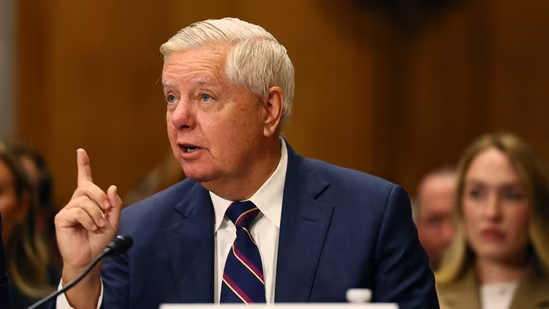
The recent statements from US Senator Lindsey Graham have caused significant international concern, especially for India, as he issued a stern warning regarding trade relations with Russia. Graham, a prominent Republican lawmaker and known ally of former President Donald Trump, has escalated rhetoric against countries purchasing Russian oil amid Russia’s ongoing war with Ukraine. This warning was echoed and elaborated upon on several platforms, including major Indian news outlets and international media, following his clear threat that the Trump administration intends to levy a 100% tariff on imports from India, China, and Brazil if they persist in buying cheap Russian oil.
Context of the Warning
The crux of Senator Graham’s warning is about cutting off the financial resources fueling Russian President Vladimir Putin’s military aggression in Ukraine. Since 2022, India and China notably increased their imports of discounted Russian crude oil due to its relatively lower price compared to global markets. Senator Graham argues that these purchases are effectively “blood money,” as they indirectly fund Russia’s war machine. He bluntly stated that the Trump administration’s response would be to impose steep tariffs—up to 100%—on oil-related imports from these countries to force them to reconsider their purchases.
In fact, this threat is part of a larger legislative push in the US Congress. Earlier in 2025, Senators Lindsey Graham and Richard Blumenthal introduced the “Sanctioning Russia Act of 2025,” which proposes economic sanctions including tariffs as high as 500% on countries continuing to import Russian oil. This bill, described by Graham as an “economic bunker buster,” targets countries like India, China, and Brazil, which together account for roughly 80% of Russia’s crude oil exports. The aim is to choke off the money powering Putin’s military operations by making trade with Russia economically prohibitive.
Impact on India-US Relations
India, a vital strategic partner to the United States, finds itself under intense geopolitical pressure. Senator Graham specifically called out India’s tariff regime as being disadvantageous to American goods, highlighting that India imposes some of the highest tariffs on US imports among global trading partners. At the same time, India’s energy security imperatives—particularly the need for affordable oil supply—complicate its position. The possibility of punitive US tariffs poses a serious risk to India’s economic interests and could affect bilateral trade relations significantly.
Multiple Indian news sources noted how the timing is sensitive, with elections imminent in both countries and energy demands rising domestically. Despite the pressure, India has maintained that it pursues an independent foreign and trade policy, balancing its relations with Russia due to historical ties and its energy needs.
Senator Graham’s Forceful Rhetoric and Political Backdrop
Graham’s statements during interviews with Fox News and other media outlets were notably pointed. He warned India, China, and Brazil that continuing their purchases would lead to their economies being “crushed” through tariffs; he stated, “we’re going to tariff the hell out of you” and that they would have “nobody to blame but yourself” if they suffer from these economic penalties.
The senator also harshly criticized Vladimir Putin’s ambitions, asserting that Putin is trying to recreate the Soviet Union by invading sovereign countries like Ukraine, which had relinquished its nuclear arsenal decades ago based on promises of sovereignty protections that Putin broke. Graham framed the impending sanctions as part of a larger strategic effort, including the flow of US weapons to Ukraine, to halt Putin’s aggression.
Legislative and Diplomatic Dimensions
The bipartisan bill sponsored by Senators Graham and Blumenthal has gained considerable cosponsorship support in Congress, signaling a strong likelihood of passage. The proposed tariffs of up to 500% go beyond previous sanctions seen during the Russia-Ukraine conflict and are designed as a “sledgehammer” to coerce allies and partners into compliance with US foreign policy objectives.
Alongside public warnings, this legislative momentum suggests that the Trump administration is prepared to use economic measures aggressively to isolate Russia and pressure countries financially supporting its war effort. The tariff threat leverages America’s economic heft to force countries like India to make tough choices between their relations with Russia and their economic ties with the US.
Potential Consequences for India
If implemented, such tariffs would substantially increase the costs of Indian exports to the US and could disrupt supply chains due to retaliatory measures. India could face a sharp decline in export competitiveness, which might hurt its growing economy and efforts to expand its global trade footprint.
At the same time, India’s energy strategy relies heavily on diversification and securing affordable oil imports, making the curtailment of Russian oil an economic challenge. Domestic political calculations, especially around elections and energy affordability, could make compliance with the US demand complex for the Indian government.
Given the severity of this confrontation, India is likely to pursue diplomatic engagement to seek exemptions or negotiate terms to avoid the economic fallout while maintaining its sovereign right to pursue its energy security needs.